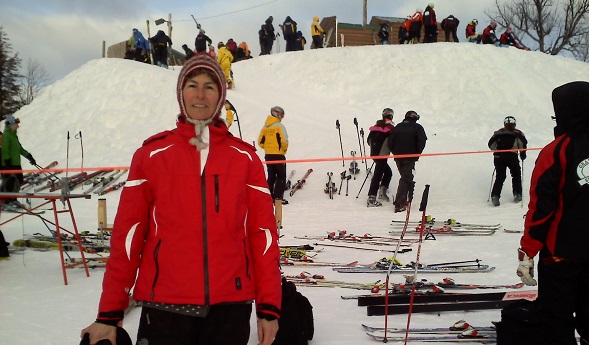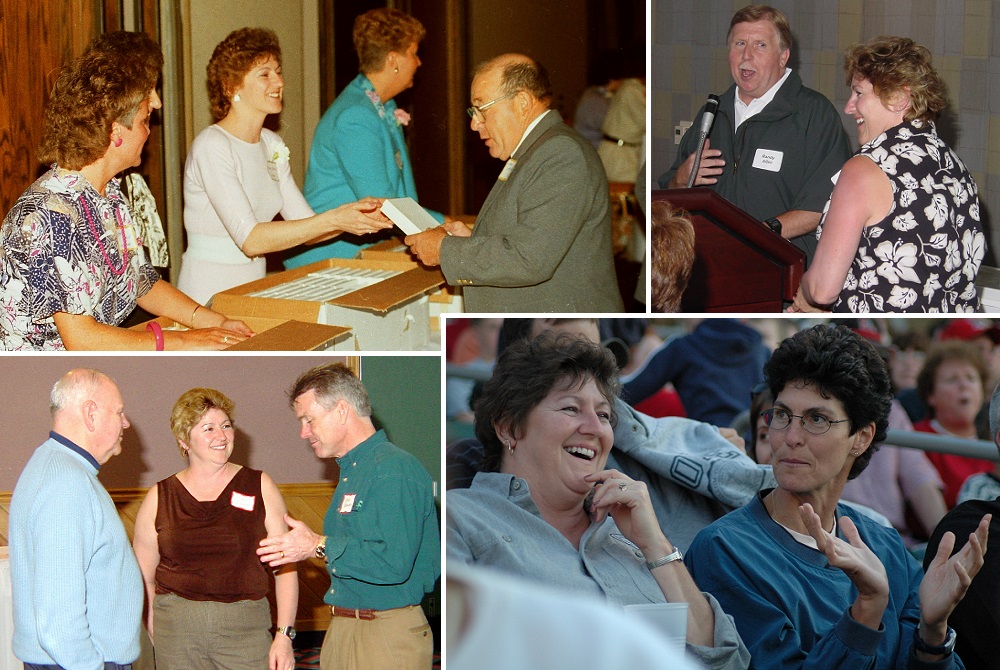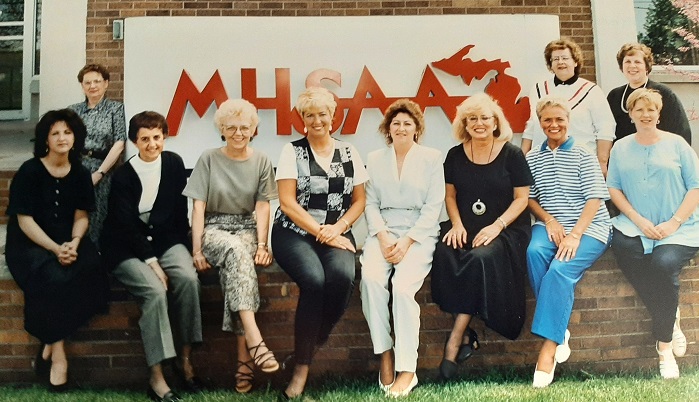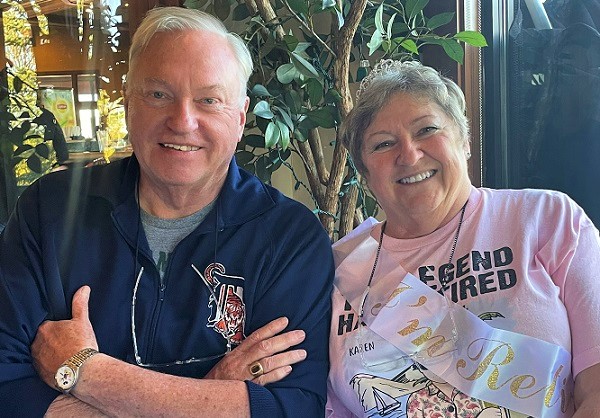
Mazzolini's Impact Felt Across Generations
By
Geoff Kimmerly
MHSAA.com senior editor
July 14, 2016
By Geoff Kimmerly
Second Half editor
A lifetime in competitive athletics has provided piles of memories for retiring MHSAA assistant director Gina Mazzolini.
 Four decades as an athlete, coach and association administrator also left her with plenty of souvenirs to sort through as she finishes her final days in the East Lansing office.
Four decades as an athlete, coach and association administrator also left her with plenty of souvenirs to sort through as she finishes her final days in the East Lansing office.
There’s a letter dated 1976 – and passed on to Mazzolini in 2004 – from the MHSAA to tennis coaches warning against stacking their lineups, an issue she’s worked to resolve over the last 20+ years.
Autographs from famous coaches John Wooden and Tom Landry made a 1991 National Federation Hall of Fame program worth saving. Just as significant was a thank-you from legendary Battle Creek St. Philip volleyball coach Sheila Guerra – who led teams to nine MHSAA titles from 1983-97 – sent in 2005 after Guerra’s daughter Vicky Groat led the Tigers to the first of what has become 10 Class D championships over the last 12 seasons.
In a number of high school sports circles, Mazzolini’s contributions are considered similarly legendary. She’s frequently been referred to as a “pioneer” – one of the first star female high school athletes from the Lansing area who went on to star at Central Michigan University and then lend her expertise to growing girls sports in this state and beyond.
“I didn’t do it because I was a woman and wanted to be the first,” Mazzolini said. “That’s just what I wanted to do, and after Title IX those jobs just opened up. And because I had some experience in coaching, officiating and playing, they took a chance on me, or they recruited me because they needed someone to run girls programs.
"I will miss people and relationships, watching things start, grow and get better.”
Mazzolini recently was recognized with a Citation from the National Federation of State High School Associations after a career that began in 1981 with Texas’ University Interscholastic League and ends after the last 23 years as an assistant director in her home state – and a mere 20 miles south of where she took the first steps toward a career that covered nearly the whole of female high school and college sports in Michigan, as a first-generation athlete and the builder of games for generations of girls and women to come.
Pioneer, indeed
Mazzolini’s senior year at St. Johns High School, 1973-74, was the first for girls basketball playoffs sponsored by the MHSAA, and Mazzolini led the Redwings to a District title that fall. She went on to star in both basketball and volleyball at CMU – still ranking among the Chippewas’ all-time hoops statistical leaders – and then to coach volleyball at Ovid-Elsie High School, Michigan State and the University of Texas.
All of that set Mazzolini up to provide a key voice and insight to rules-making bodies at the state and national levels. She’s retiring as MHSAA administrator for girls volleyball, swimming & diving, alpine skiing and tennis, and also has handled the sanctioning of out-of-state competitions and foreign exchange and international student issues. Nationally, she’s served multiple times on rules committees for soccer, swimming & diving and volleyball.
“Having worked in athletics for 46 years, I know few, if any, administrators who have a passion for excellence as does Gina Mazzolini in everything she undertakes,” wrote Marcy Weston, a retired executive associate director of athletics at CMU. “Ethics, integrity, creativity, loyalty and fortitude are just a few words that describe Gina’s work persona. And compassion, kind and supportive are words that siblings and friends access when they describe Gina.”
 Weston coached Mazzolini on the CMU volleyball team for four seasons and women’s basketball team for two. At that time, with those programs and women’s college athletics as a whole in their early stages, Mazzolini and her teammates wore the same uniforms for both sports for two years.
Weston coached Mazzolini on the CMU volleyball team for four seasons and women’s basketball team for two. At that time, with those programs and women’s college athletics as a whole in their early stages, Mazzolini and her teammates wore the same uniforms for both sports for two years.
Obviously, much has changed. And she’s played a large part.
Mazzolini first got involved as more than an athlete after taking Weston’s officiating class at CMU. Mazzolini registered as an MHSAA official – but all she knew of the MHSAA was that was where she paid her registration fee.
She still didn’t know much about state association work when offered a job at the UIL by then-executive director Bailey Marshall, who was familiar with Mazzolini because his wife Becky was the trainer for the University of Texas volleyball team when Mazzolini was an assistant coach.
“He said we’ve got to add women’s sports – they had them but not as many,” Mazzolini said. “I applied for the job and got it, and I’m still not sure what I’m going to do.”
What she lacked in initial knowledge, she made up for in passion.
Texas’ high school association at that time was adding girls tennis and soccer, beefing up some of its other offerings and reworking other sports to put females on a level playing field.
Her work there led to her first of many contributions to national rules-making committees. Early on, Mazzolini brought the perspective of someone who had played to groups that often included many who had not. She eventually chaired the volleyball committee from 2004-08 and worked with notable contributors to amateur sports including the first NCAA national coordinator of officials, Joan Powell.
“A number of people have made comments that when Gina was appointed to a national committee, the National Federation staff would breathe a sigh of relief because she would bring her patience and perspective to the table when they were forming national rules,” said MHSAA Executive Director Jack Roberts, who has served in his position since 1986.
“It’s clear to me that not just in Michigan, but across the country, there are several people who have affection for Gina as a person.”
Leaving a legacy
In addition to her recent Citation, Mazzolini is a member of the CMU Athletic Hall of Fame and received the MHSAA’s Women in Sports Leadership Award in 2010. This winter, she became the first woman to receive the MHSAA’s Charles E. Forsythe Award for her contributions to interscholastic sports.
It didn’t take long for Michigan coaches to realize she would make an impact.
 Among accomplishments she’s most proud of from her time at the MHSAA are improved relationships with the tennis and swimming communities, developed by increased communication and with the help of longtime veterans like Gary Ellis and Tiger Teusink in tennis and Denny Hill in the pool.
Among accomplishments she’s most proud of from her time at the MHSAA are improved relationships with the tennis and swimming communities, developed by increased communication and with the help of longtime veterans like Gary Ellis and Tiger Teusink in tennis and Denny Hill in the pool.
She was once told by a coach she was brave to show up at a regular-season event because of the grumbles toward the MHSAA in that sport – but soon another coach told her, “I wanted to hate you, but I like you.”
Mazzolini may choose to stick around athletics as an official, but only at the middle school level. She’ll definitely have no problems continuing to attend some of her favorite events in the sports she’s helped form over the years.
And it seems just a little coincidental that she’s stepping away from a community she’s affected so greatly at the end of the same school year that saw one of her nieces, St Johns senior Brooke Mazzolini, help the Redwings to their first MHSAA Girls Basketball Semifinal in nearly 20 years – the latest step on a path her aunt began to blaze 40 years ago, even as Gina doesn’t see herself as the “pioneer” she’s frequently made out to be.
“I played because I loved to play. I got that from my dad, and we were in an athletic neighborhood. I got into officiating and that was fun,” Mazzolini said. “And then (athletic director) Bob Forebeck at Ovid-Elsie called and said, ‘Hey I need a volleyball coach; what do you think?’ And that was a blast.
“And then I got into state associations, and I’ve really enjoyed that. There were rough patches – like when you tell people ‘no’ – but everything I’ve done, I’ve loved it. It’s hard to consider it a job, because you look forward to doing most of it.”
PHOTOS: (Top) Gina Mazzolini poses briefly while directing an MHSAA Final in skiing. (Middle) Mazzolini starred for the Central Michigan University women's basketball team. (Below) Mazzolini stands with her St. Johns high school basketball coach Beth Swears after receiving the MHSAA Women in Sports Leadership Award in 2010.

Jackson's Imprint on MHSAA Stretches 45 Years, Across 4 Executive Directors
By
Geoff Kimmerly
MHSAA.com senior editor
October 5, 2022
First impressions can be significant, as many a saying goes. And Karen Brown unknowingly provided one in 1978 that helped affect the course of athletics in this state over the next 40-plus years.
A Michigan State University student named Karen Leinaar had shown up at the Michigan High School Athletic Association for a meeting about a 5K road race she was planning that was unrelated to the MHSAA except that the building provided a good meeting place – and Brown, just a year out of high school, was the first person to greet her at the old Trowbridge Road headquarters.
Seeing someone her age immediately made Leinaar more comfortable. She ended up returning to that office several times over the years, registering as an MHSAA game official while still an MSU student and then starting a career in 1982 that has included nearly 40 years as a high school athletic director and two decades of shaping policy as part of the MHSAA Representative Council.
That’s the kind of impact that’s emanated from Karen Jackson, formerly Brown, and over the last 45 years as assistant to four of the five executive directors during the MHSAA’s 98-year history. Jackson finished that run with her retirement Friday.
“She was always one that would welcome you, and whether you walked into the office or called on the phone, she always had an answer that would calm you down or provide you with the information you needed,” said Leinaar, who currently is serving as interim athletic director at Frankfort High School in addition to her duties as executive director of the Michigan Interscholastic Athletic Administrators Association.
“I remember initially calling and needing something from Mr. Norris – it was always Mr. Norris – and she could answer the question,” Leinaar added, referring to retired MHSAA executive director Vern Norris, who served in that role from 1978-86. “You didn’t want to talk to scary Mr. Norris – Vern was a wonderful man, but he was like the superintendent or principal. Karen always had the answer. … It was always that smile that made you feel like you were more than welcomed, wanted in the office, and everything is going to be OK.”
 Jackson began at the MHSAA in June 1977, two days before her graduation from long ago-closed Harry Hill High School in Lansing.
Jackson began at the MHSAA in June 1977, two days before her graduation from long ago-closed Harry Hill High School in Lansing.
Her high school sports career amounted to about half a season on the Hill varsity volleyball team as a sophomore before she had to switch gears to begin working for the Lansing Regional Chamber of Commerce as part of a school co-op program.
Jackson graduated as a co-valedictorian of Hill’s Class of 1977. Despite her academic standing, she hadn’t received much guidance at school on the possibility of college. But she had a job offer from the Chamber – and also had heard from grade-school friend Deborah Norris (Vern’s daughter) about an opening at the MHSAA.
The MHSAA was offering more money, and Jackson was hoping to buy a car – and so at 18, she became the secretary for executive director Allen W. Bush.
The title has changed over the years, from secretary to the executive director, to executive assistant, to senior executive assistant. The MHSAA’s administrative processes obviously have changed, mostly because of technology, from everything done on paper and through the mail to just about everything conducted digitally over the internet.
But many of Jackson’s most important duties at the end of her tenure resembled those she was hired to carry out nearly half a century ago.
Setting Exemplary Expectations
Bush retired a year after Jackson began, and she then assisted Norris for his eight as executive director. She served with Jack Roberts through his 32 years as executive director from 1986-2018 and then for these first 3½ under current director Mark Uyl.
She was considered the “baby” of the MHSAA staff during her first 12 years, until she turned 30 and her support staff teammates declared she wasn’t the baby anymore during a Christmas party serenade. Just about 33 years later, she’s leaving as one of two people left who worked in the old offices before the MHSAA moved to another East Lansing headquarters at Ramblewood Drive in 1996.
School sports happen thanks to a Karen Jackson or two in every community -- people who provide the unseen support that makes these programs possible every day.
For the last 45 years, she’s provided a consistent anchor for service to 1,500 schools and millions of student-athletes across Michigan.
 “She’s shaped so much of what we’ve done,” said MHSAA assistant director Kathy Vruggink Westdorp, who joined the staff during the 2003-04 school year after more than two decades working for Grand Rapids-area schools. “Her service to schools was imperative to what she was doing, and it was a valuable part for our membership. Hers was such a dedicated service, such an exemplary service – finding solutions, to do what’s needed.”
“She’s shaped so much of what we’ve done,” said MHSAA assistant director Kathy Vruggink Westdorp, who joined the staff during the 2003-04 school year after more than two decades working for Grand Rapids-area schools. “Her service to schools was imperative to what she was doing, and it was a valuable part for our membership. Hers was such a dedicated service, such an exemplary service – finding solutions, to do what’s needed.”
There are file cabinets and libraries and hard drives at the MHSAA office, the contents of which are known by only a handful of people on Earth – and Jackson perhaps the most as she did most of the sorting and maintaining of those files over the years.
For a 1996 Lansing State Journal feature on the MHSAA’s support staff, Jackson (then Yonkers) explained “there are always new challenges, new issues and controversies. It never gets boring. In the past 19 years, we’ve slowly shifted from dealing with athletic administrators, principals and superintendents to dealing with legislators, attorneys and courts.”
The last 25 years has seen much of the work swing back to providing service directly to schools. And Jackson’s mind has become part MHSAA library and part card catalog of where to find those few snippets she might not recall immediately from the last half century.
“I guess what I’m proud of is being able to find things, to know where to find things and how to find things that other people don’t,” Jackson said. “Yes, the technology has changed everything. … We used to have more schools – they used to have 40-some Detroit public schools – and there was a whole era of (litigation), but it’s calmed down now.
“I liked what I did, and it kept me on my toes – that’s for sure.”
The MHSAA is rooted in its responsibilities as a championship and eligibility rules maker, and Jackson was involved in just about every communication in those areas during her time. Tournament changes are made at Representative Council meetings, and she’s reported the minutes for at least 150 of those, including piles of special sessions as the MHSAA managed sports through the COVID-19 pandemic. Eligibility waivers are requested at Executive Committee meetings, and she’s prepared somewhere north of 505 sets of minutes for those monthly sessions even as those agendas have grown in content substantially over the years.
Then there’s all of the correspondence from those four executive directors – all with the initials “kb” or “kj” to go with “AWB” or “VLN” or “JER” and “MU.” She also was in charge of MHSAA election ballots for 35 years, served as the lead organizer of cooperative programs, helped with football tickets for a time and briefly was part of the program-selling crew at early Football Finals at the Pontiac Silverdome.
“I think I’m pretty lucky, being on the Council and Executive Committee, that I’ve been able to work with her a lot. And most athletic directors, they may not even know who she is because they may not have contact with her or do anything with her – but she’s obviously been the unsung hero of that office,” said Vic Michaels, who serves as director of physical education & athletics for the Archdiocese of Detroit and has served on the Representative Council since 2003.
“She just does so much that you don’t really know about, especially with the Council. Whenever I need anything, Karen’s the one I call. She is the history, really. She’s the keeper of that.”
Unprecedented & 'Never to be Replicated'
A longtime co-worker of Jackson, Shirley Hytinen, retired in 1998 after just a few months more than 43 years. She too had worked for four executive directors, as she began in 1955 during the Charles E. Forsythe era.
Jackson surpassed Hytinen’s tenure a few years into Uyl’s, and can readily recall some of what stood out from all four directors she’s assisted.
Bush was “really stern” – he had served in the U.S. Marines – and she said he didn’t smile much until the day he announced his retirement, when it was “like a switch turned. He was smiling and happy and joking around.”
Norris was “the sweetest guy in the world.” Jackson had bought her first house in her mid-20s and was preparing to move in with only her dad and his motor home to assist, when Norris showed up to help at 7:30 a.m. that morning to provide another set of hands.
Roberts is known by Michigan administrators and national colleagues for his writing, and Jackson said jokingly she still “cringes” when she sees a yellow legal pad. She was an important proofreader and spent the majority of her career serving with her desk just a few paces away from that of the recent National Federation Hall of Fame selection, and she attended his induction this past summer and San Antonio.
 Roberts pointed out that during the 1980s, the MHSAA would conduct nine Executive Committee meetings, each averaging fewer than 10 requests for waivers. By the end of his 32 years, there were 11 Executive Committee meetings annually – with approximately 50 waiver requests presented on average. Still, he and Jackson were able to process the meeting minutes and continue to distribute those decisions within 24 hours.
Roberts pointed out that during the 1980s, the MHSAA would conduct nine Executive Committee meetings, each averaging fewer than 10 requests for waivers. By the end of his 32 years, there were 11 Executive Committee meetings annually – with approximately 50 waiver requests presented on average. Still, he and Jackson were able to process the meeting minutes and continue to distribute those decisions within 24 hours.
“Over the more than three decades that Karen and I worked together at the MHSAA, the work became increasingly more voluminous and complicated – and Karen kept finding ways to increase our efficiency and maximize our output,” Roberts said.
Like Norris when Bush was executive director, Uyl had been part of the MHSAA staff under Roberts since 2004 before eventually moving into the corner office. After those first 15 years together, Uyl knew what a valuable person he had just a few yards away to assist in his transition, and “he just says to do this” and allows his staff to run with it, which Jackson enjoyed.
Her duties have been shifted confidently, mostly to Jamie VanDerMoere, another longtime administrative assistant who is best-known to Michigan school sports people for her leadership with the annual wrestling championship tournaments.
Jackson recently was married to Jim Jackson, and they have plans as they close in on their first anniversary – they’re hoping to travel to Italy at some point and also The Masters in Augusta, Ga., next spring. “I’m not going to miss coming to work every day, but the people,” Karen Jackson said.
And many in school sports across Michigan, although they may not realize it, will miss the contributions Jackson has made to their community over the decades including the context she’s provided as thousands of decisions have been made.
“Not only her understanding of our regulations and the processes of our regulations, but understanding why we have those things in place – when someone does something 45 years, you get a lot of historical context,” Uyl said. “What’s made her so effective is understanding the why – and that to me is something that’s almost impossible to replace.
“When an organization has been around 98 years with only five directors, it says something to have worked for four out of the five. That will never be replicated again.”
PHOTOS (Top) From top left, Karen Jackson has been a mainstay of the MHSAA for decades – serving membership, working with administrators like Randy Allen and Gina Mazzolini or serving as assistant to executive directors like Jack Roberts (right) and Vern Norris. (Middle) Jackson, sitting fourth from left, was the “baby” of the MHSAA staff after joining when she was 18. (Below) Jackson and husband Jim have plans to travel in retirement. (MHSAA archives.)

